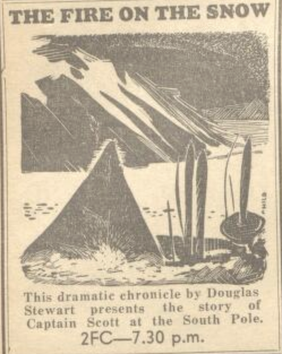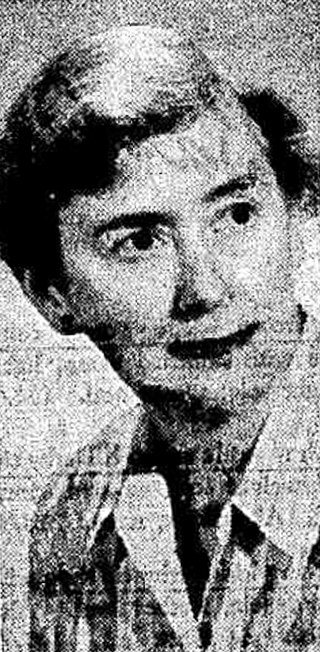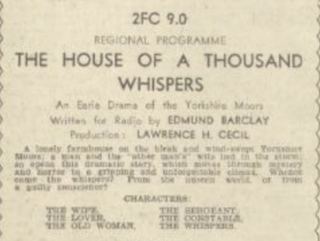Related Research Articles
Edmund Piers Barclay was an English-Australian writer known for his work in radio drama. Radio historian Richard Lane called him "Australian radio's first great writer and, many would say, Australian radio's greatest playwright ever." Frank Clelow, director of ABC Drama, called him "one of the outstanding radio dramatists of the world, with a remarkable technical skill and ability to use the fade-back without confusing the audience."

The Fire on the Snow is a 1941 Australian verse play by Douglas Stewart about the Terra Nova Expedition to Antarctica by Robert Falcon Scott. It premiered on ABC radio on 6 June 1941 to great acclaim and inspired a series of Australian verse dramas on ABC radio.
Ned Kelly is a 1942 radio play by Douglas Stewart about the outlaw Ned Kelly.

Catherine Shepherd was a Southern Rhodesian-born Australian writer. She wrote for journals, stage and radio – short stories, plays and serials.
Red Sky at Morning is a 1935 Australian stage play by Dymphna Cusack. The play helped launch Cusack's writing career and was filmed in 1943.
Wives Have Their Uses is a 1938 Australian stage play by Gwen Meredith. It is a comedy.

An Antarctic Epic is a 1933 Australian radio drama by Edmund Barclay about the Scott Expedition to Antarctica. It was the first radio drama script by Barclay who went on to become arguably Australia's leading radio writer.
Henry Lawson Stories was a name given to a series of 1937 Australian radio plays on the ABC where Edmund Barclay adapted stories of Henry Lawson.
Singapore Spy is a 1939 Australian radio drama serial from Edmund Barclay set in Singapore. It was an adventure serial in the vein of his earlier works Khyber and Shanghai.

The House of a Thousand Whispers is a 1936 Australian radio play by Edmund Barclay.
A Sirius Cove is a 1935 Australian comedy play by Lionel Shave.

Love o' Land is a 1934 Australian radio play by Edmund Barclay. It was described as a "cavalcade of Australian history" and involved a family whose adventures coincided with ten scenes in Australian history from 1788 onwards.
The Jackeroo is a 1937 Australian radio play by Richard Barry.

The Flying Swan is a 1939 Australian radio play by Catherine Shepherd. It told the story of Hans Christian Andersen. The play was one of Shepherd's major works.
Exit Socrates is a 1939 Australian radio play by Catherine Shepherd. It was considered one of the more notable Australian radio plays of that year.
A Citizen of the World is a 1940 Australian radio play by Catherine Shepherd about Oliver Goldsmith. It was one of her most notable works.

The Valiant Tinker is a 1939 Australian radio play by Catherine Shepherd about John Bunyan. The play was popular and was performed again in 1941 and 1950.
Three Mile Cross is a 1940 Australian radio play by Catherine Shepherd about Mary Mitford.

Lethe Wharf is a 1939 Australian radio play by Catherine Shepherd. The play was one of Shepherd's key works.
Seapiece is a 1938 Australian radio play by Catherine Shepherd about an out of work actor.
References
- ↑ "Good Play Well Produced". The Mercury . Vol. CXLIX, no. 21, 117. Tasmania, Australia. 1 August 1938. p. 5. Retrieved 24 July 2023– via National Library of Australia.
- ↑ "The Drama in Ausctralia". The West Australian . Vol. 55, no. 16, 553. Western Australia. 22 July 1939. p. 5. Retrieved 24 July 2023– via National Library of Australia.
- ↑ "Plays of the Air— Catherine Shepherd", ABC Weekly, 2 (22), Sydney: ABC, 1 June 1940, nla.obj-1370701369, retrieved 5 September 2023– via Trove
- ↑ "PLAYWRIGHTS OF AUSTRALIA FLAIR FOR CHARACTER STUDY", The Wireless Weekly: The Hundred per Cent Australian Radio Journal, 35 (30), Sydney: Wireless Press, July 27, 1940, retrieved 5 September 2023– via Trove
- ↑ ""Oliv[?]" Looks at Life Topics of the Moment from a Woman's Point of View". The Mercury . Vol. CLXVI, no. 24, 010. Tasmania, Australia. 20 November 1947. p. 10. Retrieved 24 July 2023– via National Library of Australia.
- ↑ "Play on Tasmania Well Received". The Mercury . Vol. CLXXIV, no. 25, 942. Tasmania, Australia. 15 February 1954. p. 6. Retrieved 24 July 2023– via National Library of Australia.
- ↑ Rees, Leslie (1953). Towards an Australian Drama. p. 117.
- ↑ "Between You and Me and the Microphone", The Wireless Weekly: The Hundred per Cent Australian Radio Journal, 31 (22), Sydney: Wireless Press, June 3, 1938, nla.obj-714445799, retrieved 5 September 2023– via Trove
- ↑ "REPERTORY PLAY". The Mercury . Vol. CXLIX, no. 21, 118. Tasmania, Australia. 2 August 1938. p. 2. Retrieved 24 May 2024– via National Library of Australia.
- ↑ "Australian Radio Drama Week Commissions Festival —May 8–15", The Wireless Weekly: The Hundred per Cent Australian Radio Journal, 31 (17), Sydney: Wireless Press, April 29, 1938, retrieved 5 September 2023– via Trove
- ↑ "Plays of the Air — Catherine Shepherd", ABC Weekly, 2 (22), Sydney, 1 June 1940, retrieved 24 July 2023– via Trove
- ↑ ABC Weekly, vol. 6, Sydney, 15 April 1944, retrieved 5 September 2023– via Trove
{{citation}}: CS1 maint: location missing publisher (link) - ↑ "A.B.C. Radio Plays", ABC Weekly, 13 (1), Sydney, 6 January 1951, retrieved 5 September 2023– via Trove
- ↑ "MUSIC AND DRAMA TIBBETT BEGINS TOUR THIS MONTH". The Mercury . Vol. CXLVIII, no. 21, 026. Tasmania, Australia. 15 April 1938. p. 6. Retrieved 24 May 2024– via National Library of Australia.
- ↑ "Repertory Play". The Mercury . Vol. CXLIX, no. 21, 118. Tasmania, Australia. 2 August 1938. p. 2. Retrieved 24 July 2023– via National Library of Australia.
- ↑ "AUSTRALIAN PLAYS". The Sydney Morning Herald . No. 32, 689. New South Wales, Australia. 3 October 1942. p. 6. Retrieved 24 May 2024– via National Library of Australia.
- ↑ ""DAYBREAK."". The Sydney Morning Herald . No. 31, 718. New South Wales, Australia. 28 August 1939. p. 5. Retrieved 24 May 2024– via National Library of Australia.
- ↑ Australasian Radio Relay League. (June 21, 1939), "Tasmania In Penal Days", The Wireless Weekly: The Hundred per Cent Australian Radio Journal, Sydney: Wireless Press, nla.obj-725841888, retrieved 24 May 2024– via Trove